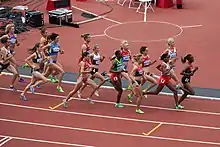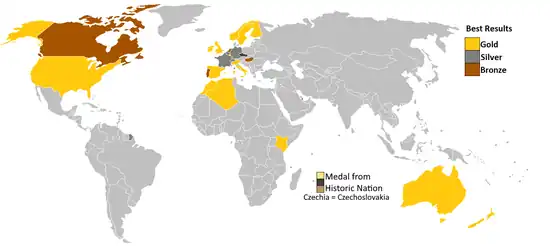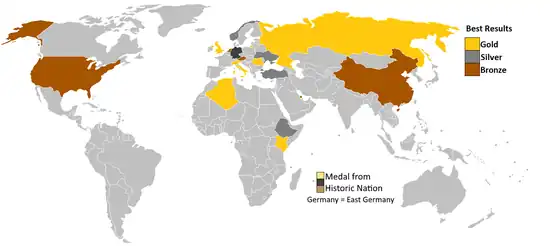1500 metres at the Olympics
The 1500 metres at the Summer Olympics has been contested since the first edition of the multi-sport event. The men's 1500 m has been present on the Olympic athletics programme since 1896. The women's event was not introduced until over seventy years later, but it has been a permanent fixture since it was first held in 1972. The Olympics final and the World Athletics Championships final are the most prestigious 1500 m races at an elite level. The competition format comprises three rounds: a heats stage, semi-finals, then a final typically between twelve athletes.
| 1500 metres at the Olympic Games | |
|---|---|
 The 2012 Olympic women's 1500 m heats | |
| Overview | |
| Sport | Athletics |
| Gender | Men and women |
| Years held | Men: 1896 – 2021 Women: 1972 – 2021 |
| Olympic record | |
| Men | 3:28.32 Jakob Ingebrigtsen (2021) |
| Women | 3:53.11 Faith Kipyegon (2021) |
| Reigning champion | |
| Men | |
| Women | |
The 1500 meters was one of four individual events documented exclusively by Olympic documentary filmmaker Bud Greenspan.[1]
The Olympic records for the event are 3:28.32 minutes for men, set by Jakob Ingebrigtsen in 2021, and 3:53.11 minutes for women, set by Faith Kipyegon in 2021. The 1500 metres world record has been broken several times at the Olympics: the men's record was beaten in 1900, 1936, and 1960, while the women's record was improved in 1972 (three times) and in 1980.[2]
Only three athletes have defended the Olympic 1500 m title: Tatyana Kazankina became the first person to win two gold medals in the event in 1980 (repeating her 1976 win) and, soon after, Sebastian Coe became the first man to do so in 1980 and 1984. Faith Kipyegon is the latest athlete to accomplish the feat, by following up her gold medal in 2016 with another at Tokyo 2020. No athlete of either sex has won more than two medals. Historically, athletes in this event have also had success in the 800 metres at the Olympics. Kelly Holmes was the last athlete to win both events at the same Olympics in 2004. 2012 1500m gold medalist Taoufik Makhloufi made both podiums without winning gold in 2016.
Kenya is the most successful nation in the event, having won seven gold medals. Great Britain has the next highest number of gold medals, with six. The United States is the only nation to have swept the medals in the event, having done so in St. Louis in 1904, albeit in a final between seven Americans and two foreigners.
Medal summary
Men
Multiple medalists
| Rank | Athlete | Nation | Olympics | Gold | Silver | Bronze | Total |
|---|---|---|---|---|---|---|---|
| 1 | Sebastian Coe | 1980–1984 | 2 | 0 | 0 | 2 | |
| 2 | Kipchoge Keino | 1968–1972 | 1 | 1 | 0 | 2 | |
| 2 | Fermin Cacho | 1992–1996 | 1 | 1 | 0 | 2 | |
| 2 | Hicham El Guerrouj | 2000–2004 | 1 | 1 | 0 | 2 | |
| 2 | Taoufik Makhloufi | 2012–2016 | 1 | 1 | 0 | 2 | |
| 6 | Luigi Beccali | 1932–1936 | 1 | 0 | 1 | 2 | |
| 7 | Bernard Lagat | 2000–2004 | 0 | 1 | 1 | 2 | |
| 7 | Nick Willis | 2008-2016 | 0 | 1 | 1 | 2 |
Medals by country

| Rank | Nation | Gold | Silver | Bronze | Total |
|---|---|---|---|---|---|
| 1 | 5 | 5 | 4 | 14 | |
| 2 | 4 | 3 | 2 | 9 | |
| 3 | 3 | 7 | 4 | 14 | |
| 4 | 3 | 1 | 3 | 7 | |
| 5 | 3 | 0 | 1 | 4 | |
| 6 | 2 | 1 | 0 | 3 | |
| 7 | 2 | 0 | 1 | 3 | |
| 8 | 1 | 2 | 1 | 4 | |
| 9 | 1 | 1 | 1 | 3 | |
| 10 | 1 | 1 | 0 | 2 | |
| 11 | 1 | 0 | 1 | 2 | |
| 12= | 1 | 0 | 0 | 1 | |
| 12= | 1 | 0 | 0 | 1 | |
| 12= | 1 | 0 | 0 | 1 | |
| 15 | 0 | 3 | 2 | 5 | |
| 16= | 0 | 1 | 1 | 2 | |
| 16= | 0 | 1 | 1 | 2 | |
| 18= | 0 | 1 | 0 | 1 | |
| 18= | 0 | 1 | 0 | 1 | |
| 18= | 0 | 1 | 0 | 1 | |
| 21 | 0 | 0 | 2 | 2 | |
| 22= | 0 | 0 | 1 | 1 | |
| 22= | 0 | 0 | 1 | 1 | |
| 22= | 0 | 0 | 1 | 1 | |
| 22= | 0 | 0 | 1 | 1 | |
| 22= | 0 | 0 | 1 | 1 |
- nb The German total includes teams both competing as Germany and the United Team of Germany, but not East or West Germany.
Women
Multiple medalists
| Rank | Athlete | Nation | Olympics | Gold | Silver | Bronze | Total |
|---|---|---|---|---|---|---|---|
| 1= | Tatyana Kazankina | 1976–1980 | 2 | 0 | 0 | 2 | |
| 1= | Faith Kipyegon | 2016–2021 | 2 | 0 | 0 | 2 | |
| 3 | Gunhild Hoffmeister | 1972–1976 | 0 | 2 | 0 | 2 | |
| 4 | Gabriela Szabo | 1996–2000 | 0 | 1 | 1 | 2 |
Medalists by country

| Rank | Nation | Gold | Silver | Bronze | Total |
|---|---|---|---|---|---|
| 1 | 3 | 1 | 2 | 6 | |
| 2 | 3 | 0 | 0 | 3 | |
| 3 | 2 | 0 | 0 | 2 | |
| 4 | 1 | 3 | 3 | 7 | |
| 5= | 1 | 1 | 0 | 2 | |
| 5= | 1 | 1 | 0 | 2 | |
| 7 | 1 | 0 | 1 | 2 | |
| 8 | 0 | 3 | 1 | 4 | |
| 9= | 0 | 1 | 1 | 2 | |
| 9= | 0 | 1 | 1 | 2 | |
| 10 | 1 | 0 | 0 | 1 | |
| 11 | 0 | 1 | 0 | 1 | |
| 12= | 0 | 0 | 1 | 1 | |
| 12= | 0 | 0 | 1 | 1 | |
| 12= | 0 | 0 | 1 | 1 | |
| 12= | 0 | 0 | 1 | 1 |
Intercalated Games
The 1906 Intercalated Games were held in Athens and at the time were officially recognised as part of the Olympic Games series, with the intention being to hold a games in Greece in two-year intervals between the internationally held Olympics. However, this plan never came to fruition and the International Olympic Committee (IOC) later decided not to recognise these games as part of the official Olympic series. Some sports historians continue to treat the results of these games as part of the Olympic canon.[4]
At this event a men's 1500 m was held and the reigning 800 metres and 1500 m champion from the 1904 Olympics, James Lightbody, was the winner. Two 1908 Olympic participants, Britain's John McGough and Sweden's Kristian Hellström were the silver and bronze medalists.[5]
| Games | Gold | Silver | Bronze |
|---|---|---|---|
| 1906 Athens |
References
- Participation and athlete data
- Athletics Men's 1500 metres Medalists. Sports Reference. Retrieved on 2014-02-07.
- Athletics Women's 1500 metres Medalists. Sports Reference. Retrieved on 2014-02-07.
- Olympic record progressions
- Mallon, Bill (2012). TRACK & FIELD ATHLETICS - OLYMPIC RECORD PROGRESSIONS. Track and Field News. Retrieved on 2014-02-07.
- Specific
- "Bud Greenspan Films". Archived from the original on 2007-07-16. Retrieved 2018-11-13.
- "12th IAAF World Championships In Athletics: IAAF Statistics Handbook. Berlin 2009" (PDF). Monte Carlo: IAAF Media & Public Relations Department. 2009. pp. Pages 546, 549. Archived from the original (PDF) on June 29, 2011. Retrieved August 4, 2009.
- On 17 August 2015, the Court of Arbitration for Sport says it approved a settlement agreed to by Turkish athlete Aslı Çakır Alptekin and the IAAF. Alptekin has agreed to forfeit her 1500 metres Olympic title and serve an eight-year ban for blood doping.12 On 29 March 2017, Turkish athlete Gamze Bulut was banned for doping and lost her Olympic silver medal. Maryam Yusuf Jamal of Bahrain was advanced to gold, the silver medal was awarded to Tatyana Tomashova of Russia, and the bronze medal was awarded to Abeba Aregawi of Ethiopia. Tomashova was earlier found guilty of doping and missed the 2008 Olympics because of that, and was banned after the Olympics for failing another drug test.3
- 1906 Athina Summer Games. Sports Reference. Retrieved on 2014-01-26.
- Athletics at the 1906 Athina Summer Games: Men's 1500 metres. Sports Reference. Retrieved on 2014-01-26.
External links
- IAAF 1500 metres homepage
- Official Olympics website
- Olympic athletics records from Track & Field News